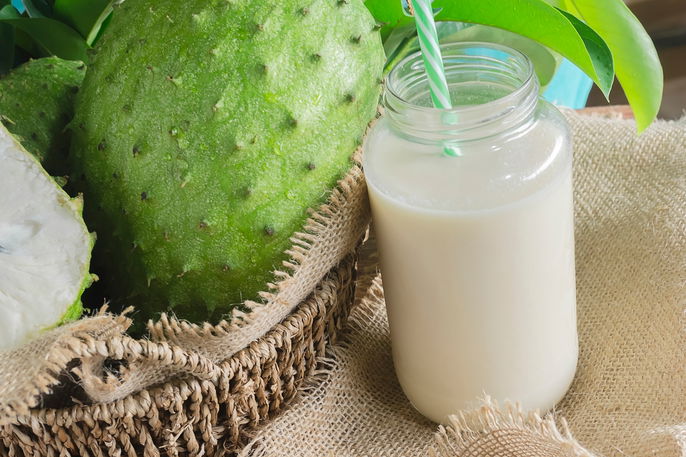Soursop juice offers various health benefits, which include supporting weight loss, preventing anemia, relieving constipation, maintaining healthy skin, and preventing high blood pressure.
These benefits come from high quantities of flavonoids and vitamin C in soursop, in addition to fiber, nutrients, and bioactive compounds that possess antioxidant, laxative, and anti-inflammatory properties.
To obtain all of the benefits of soursop juice it is important to include it as one part of a healthy, well-balanced diet in combination with regular physical exercise.

Health benefits
The main benefits of soursop juice are:
1. Supporting weight loss
Soursop juice is low in calories and is a great option for people who are trying to lose weight.
To help achieve weight loss, soursop juice should be included as part of a diet designed to maintain a calorie deficit that is used in combination with regular physical exercise.
2. Preventing anemia
Soursop juice is a good source of vitamin C and can help prevent anemia by improving iron absorption in the body to help with the formation of hemoglobin, a component of red blood cells responsible for transporting oxygen throughout the body that is typically low in people with anemia.
3. Relieving constipation
Due to its high fiber and water content, soursop juice helps hydrate the stool and prevent the formation of dry, hard stool that can lead to constipation. In this way, soursop juice can help prevent and relieve constipation.
4. Maintaining healthy skin
Soursop juice is rich in vitamin C, which helps maintain healthy skin by combating free radicals and playing a role in the production of collagen, a protein that is important for skin regeneration and wound healing.
Vitamin C also helps maintain firmness and elasticity of the skin to prevent wrinkles and sagging skin.
5. Helping prevent high blood pressure
Soursop juice helps prevent high blood pressure because it contains flavonoids, lutein, and vitamin C that reduce inflammation in the arteries and improve blood circulation due to their antioxidant and anti-inflammatory properties.
6. Lowering the risk of cancer
Flavonoids and acetogenins are antioxidants found in soursop juice that help combat free radicals, which may help inhibit tumor cell growth and potentially lower the risk of cancer.
Also recommended: Vitamin C Foods: 21 Foods, Supplements & How to Consume tuasaude.com/en/vitamin-c-foodsNutrition facts
The following table provides nutritional information for a 200 mL (6 oz) glass of soursop juice without added sugar:
Soursop juice should be consumed as one part of a healthy, well-balanced diet combined with regular physical exercise in order to obtain all of the health benefits listed above.
How to make
To make soursop juice, simply combine ½ cup soursop fruit without the seeds and 1 cup (8 oz) of cold water in a blender and blend until smooth.
Transfer to a glass and drink, preferably without straining or adding sugar. Soursop juice can be consumed daily with meals or snacks.
Contraindications and precautions
Soursop juice should not be consumed by people with Parkinson's disease or low blood pressure, as soursop can make symptoms of these conditions worse.
In addition, people with liver or kidney problems and those taking medications for depression, high blood pressure, or diabetes should only drink soursop juice if approved by a healthcare provider, as soursop may increase or decrease the effects of these medications.
Healthy recipes
Some examples of delicious recipes for soursop juice include:
1. Soursop juice with milk
Ingredients:
- 200 mL (6 oz) milk or non-dairy substitute;
- ½ cup soursop fruit without the seeds;
- 1 Tbsp honey or one packet of sweetener;
- Ice as desired.
Directions:
Place all of the ingredients in a blender and blend for 2 to 3 minutes. Transfer to a glass and serve.
2. Soursop juice with lemon
Ingredients:
- ½ cup soursop fruit without the seeds;
- 1 cup (8 oz) filtered water;
- Juice of ½ a lemon;
- 1 Tbsp honey or one packet sweetener;
- Ice as desired.
Directions:
Place the soursop, water, honey (or sweetener), and ice in a blender and blend until well-combined. Transfer to a glass and serve.
Frequently asked questions
Common questions about soursop juice include:
1. Is soursop juice bad for the liver?
Intermittent consumption of soursop juice is not bad for the liver, however some studies show that frequent consumption of soursop juice may cause damage to the liver and kidneys.
Be sure to speak to your healthcare provider or a registered dietitian about the duration and frequency of soursop juice that is right for you, especially if you are actively managing a chronic illness.
2. Is soursop juice bad for the stomach?
No, soursop juice is not bad for the stomach. Soursop contains flavonoids, tannins, and phenolic acids that possess antioxidant, anti-inflammatory, and gastroprotective properties that protect the lining of the stomach, improve digestion, and help treat ulcers and gastritis.
3. Does soursop juice help with bowel movements?
Yes, soursop juice can help regulate bowel movements due to its high fiber and water content that increases stool volume and hydrates the stool.
4. Is soursop juice safe in pregnancy?
People who are pregnant or breastfeeding should only drink soursop juice if approved by their OBGYN or midwife. This is due to a lack of information about the safety of soursop juice in these populations.






























